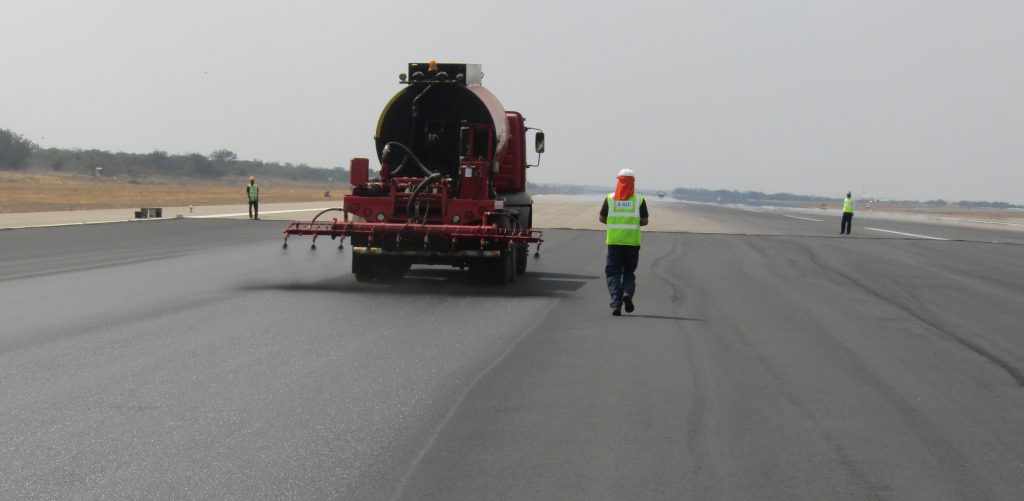- Patented Airport Grade Steel Guard (AGSG) technology used for Main Runway preservation
- First phase covered one-third of the Main Runway preservation
- Secondary Runway handled the air traffic during the period; no impact on airport operations
GMR Hyderabad International Airport Ltd. (GHIAL), which operates Rajiv Gandhi International Airport (RGIA), Hyderabad has announced that it has recently completed the first phase of the pavement preservation of its Main Runway (09/27), which will extend its life for several more years.
The airport has used a unique and patented Airport Grade Steel Guard (AGSG) technology, which is an asphalt protective coat application designed to preserve and extend the life of existing asphalt pavement surfaces. This innovative technology has quick-setting feature, which enables the runway to take the load of normal air traffic after 2 hours of application in day-time and 45 mins in between the layers’ application.
The first phase of the project has taken care of almost one-third of the Main Runway. During this period, the Main Runway was closed from 1100hrs to 1700hrs. During this 6-hour window, all air traffic movement was switched to the secondary runway with absolutely no impact on airport operations. Since, the innovative AGSG technology does not incur excavation of the pavement, the main runway was fully operational before and after the activity every day till the project got over.
Hyderabad International Airport had engaged vendors based in Mumbai and the technology implemented is provided by a US based firm. The innovative technology has helped the airport to complete the project in less than 15 days as against the conventional mode of runway preservation, which would have taken more than 3 months to finish.
Speaking on this occasion, Mr. SGK Kishore, CEO, GHIAL, said, “GHIAL has always been spearheading innovation and new-age technology adoption. Keeping an eye on advancements in airport technologies globally, we have been adopting new and proven practices to continuously enhance our operational excellence. Along similar lines, we have adopted a new, proven and patented Airport Grade Steel Guard technology for preserving our decade-long Main Runway. We believe this technology will extend our runway’s life to meet the future requirement. During the entire project, the airport operations was never impacted as our secondary runway handled all flight operations.”
Mr. Kishore, further added, “The effectiveness of this new cutting-edge technology was rightly experienced during the recent tyre-burst incident of an Indigo Aircraft, wherein not a single portion of the main Runway was impacted due to this incident and the Runway could be put into operations immediately after the affected aircraft was removed from the Runway in no time.”
Asphalt airfield pavements particularly runways are subject to various stresses like air traffic counts, fuel spillage, weathering exposures (Sun, UV rays and rain) Jet blasting or torching by jet engines along with heavy duty usage – all these result in the subsequent deterioration of asphalt pavements. The pavement slowly begins to weaken, resulting in loosening of aggregate particles and binder. Over a period of time, this leads to the loss of larger aggregate particles, cracking, water penetration and ultimately failure.
The conventional method to preserve the runway pavement is through Milling and Hot Mix Overlay, which is expensive and time consuming process. Airport Grade Steel Guard technology is economic both in terms of cost and time, besides it is eco-friendly.








